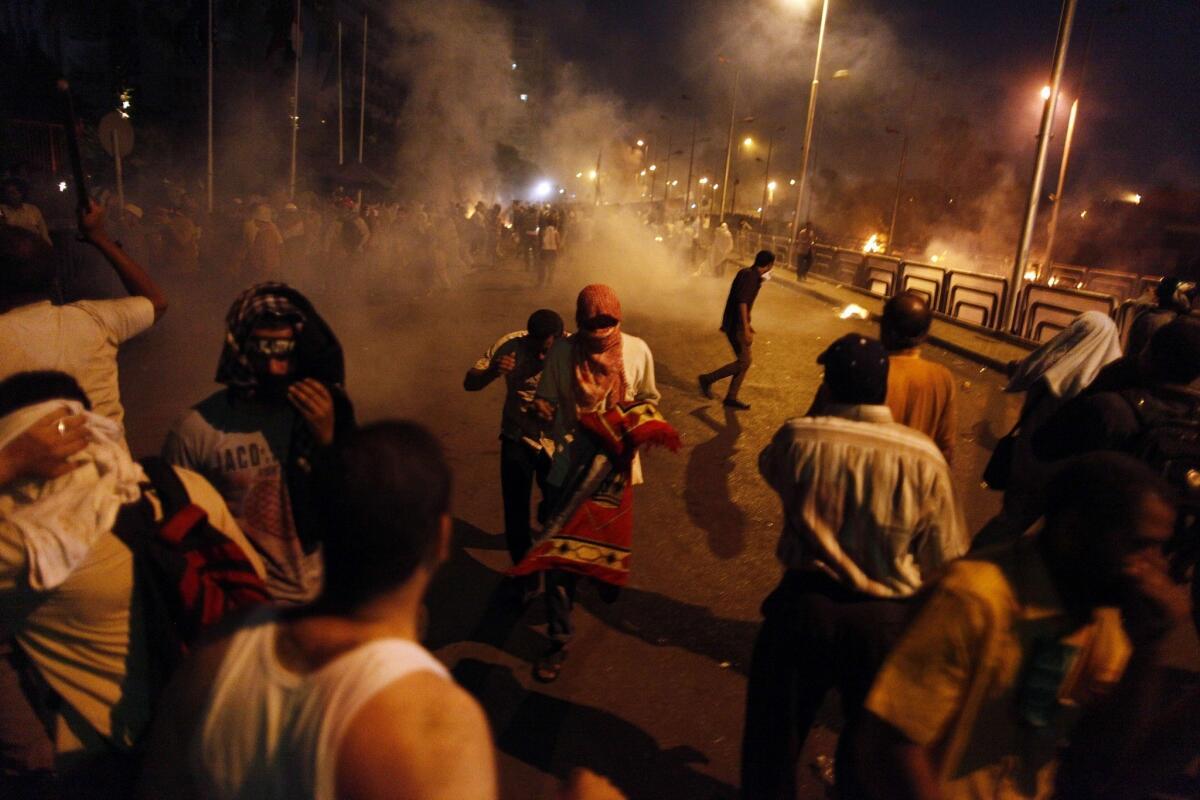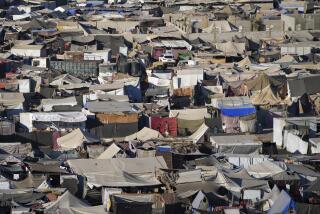Egyptian army accused of attacking Morsi supporters; dozens dead

CAIRO -- A night of largely peaceful protests ended early Monday in a deadly clash between Muslim Brotherhood supporters and Egyptian soldiers, according to the Brotherhood and Egyptian media, leaving at least 34 dead. The incident carried ominous implications for the new military-led government.
Muslim Brotherhood officials, who are supporting ousted Islamist President Mohamed Morsi, said security forces raided their encampment outside the Republican Guard compound with tear gas and gunfire about 4 a.m. Supporters of Morsi have camped there for days demanding the release of the former leader, who has been under arrest since a military coup last week.
The Brotherhood said 37 people had been killed, including five children, and 500 wounded. The Associated Press quoted an official with the Egyptian Health Ministry as saying that at least 34 were dead and 300 wounded. Earlier, an Army official had told the AP that at least five people were slain when they stormed a military building.
Witnesses said the attack began as they were praying when soldiers and police fired tear gas from opposite sides of the protesters. As demonstrators attempted to flee, they said they came under fire from snipers firing from rooftops.
Egyptian television showed chaotic scenes of bloodied, unconscious protesters lying in makeshift triage facilities. They also showed more than a dozen bodies under sheets and Egyptian flags.
Egyptian media quoted military sources as blaming the attack on âunknown gunmen,â but Muslim Brotherhood officials say they have the bullet cartridges to prove it was carried out by state security forces.
The hard-line Islamist Nour Party said it was pulling out of the anti-Morsi coalition in light of the attack, according to a Twitter message from the groupâs spokesman. Muslim Brotherhood leaders were calling on its supporters and all Egyptians to take to the streets in protest.
âBloodbath!â tweeted Muslim Brotherhood spokesman Gehad Haddad.
In an interview with Al Jazeera television, Haddad said Egypt had returned to a âfull-fledged police state in just five days.â
Hours earlier, Egyptâs new interim leadership had narrowed in on a compromise candidate to serve as the next prime minister. The state-run Ahram website and other Egyptian media reported that the new front-runner is Ziad Bahaa El-Din, a founding member of the Egyptian Social Democratic Party.
El-Din is an attorney and former parliament member who previously served as an economic advisor, financial regulator and head of Egyptâs General Authority for Investment under the government of deposed President Hosni Mubarak.
El-Din is seen as a less divisive choice than secular opposition leader Mohamed ElBaradei, whose nomination was abruptly blocked by the Nour Party a day earlier.
Under the latest scenario, ElBaradei would become vice president, Ahram reported. El-Din and interim government officials cautioned that no final decision has been made.
The debate over the prime minister marked the first standoff within the unlikely coalition of divergent opposition parties that came together last week to support the militaryâs toppling of Morsi.
The military and interim President Adly Mahmoud Mansour had hoped the swift appointment of a prime minister would send a message of stability and confidence to both Egyptians and the international community. Instead, the fumbling raised fresh doubts about Egyptâs political future.
Though viewed as a liberal, El-Din is seen as someone who will focus on improving Egyptâs sagging economy and reforming corrupt government institutions.
He has been an outspoken police critic and blamed Morsi for failing to adopt a more inclusive approach during his year in office.
Liberal youth activists, led by the Rebel movement that helped organize the mass protests that ousted Morsi, pushed hard for ElBaradei, a Nobel Peace Prize laureate and former head of the International Atomic Energy Agency.
On Sunday, throngs of Egyptians from both sides had voiced their views in mass protests â largely peaceful until the early morning violence.
In the Nasr neighborhood, speakers denounced last weekâs coup as illegitimate and called on mid-level army officers to revolt against top generals who pushed Morsi out.
âWe will stay here for as long as it takes and peacefully pressure the army to reinstate Morsi,â said Gamal Ragab, 41.
And in Tahrir Square, the number of anti-Morsi demonstrators surged into the tens of thousands early Sunday evening.
âWe want to build the democracy that we dreamed of in 2011, not a religious state where religion is used to divide the whole population and exclude anyone who doesnât share the Brotherhoodâs ideology,â said Samira Kamel, 21, a Cairo student. âWe want to show the world that this is a popular revolution, not a coup.â
Hassan is a special correspondent. Special correspondent Ingy Hassieb contributed to this report.
[Updated, 12:20 a.m. July 8: This post has been updated to include Egyptian Health Ministry estimate of the death toll, and witnessesâ description of how the attack began.]
ALSO:
British rejoice at Andy Murrayâs Wimbledon victory
Five dead, 40 still missing in Quebec train accident
Egypt: Dueling Cairo demonstrations clamor to be heard
More to Read
Sign up for Essential California
The most important California stories and recommendations in your inbox every morning.
You may occasionally receive promotional content from the Los Angeles Times.










